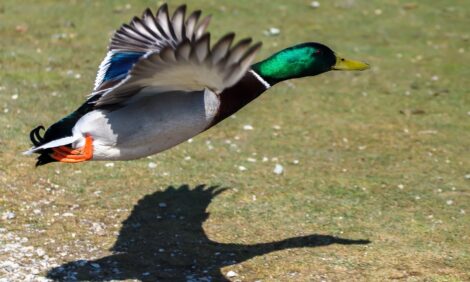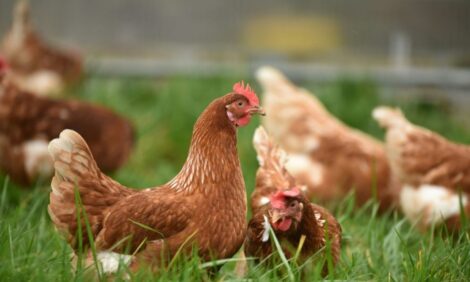



Poulvac® Procerta™ HVT-ND provides effective protection against velogenic Newcastle disease virus strain
Simplifying producers’ vaccination strategies in Asia and the Middle EastA recombinant herpesvirus of turkey ND vaccine (rHVT-ND) against Marek’s disease (MD) and Newcastle disease (ND) has been found to provide effective protection against ND virus (NDV) genotype VII — a velogenic strain prevalent in Asia and the Middle East that has many subtypes and can cause mortalities of up to 100% in unvaccinated birds.
The vaccine, Poulvac® Procerta™ HVT-ND, proved effective when used either alone or in combination with conventional live and inactivated ND vaccines.
Low mortality underlines efficacy
In research carried out at Universiti Putra Malaysia,[i] 100% of specific-pathogen-free (SPF) birds vaccinated in ovo with Poulvac Procerta HVT-ND at 18 days of incubation were found to be protected against NDV genotype VIIh challenge at both 21 and 28 days of age. For birds vaccinated subcutaneously at day of age, 95% protection was seen when challenged at 21 days of age and 100% at 28 days.
Many producers in Asia believe that a vector vaccine alone is not sufficient to protect their flocks against velogenic NDV, based on their previous experiences with vector vaccines and their current level of field challenge. With that in mind, groups of birds were also challenged after vaccination with Poulvac Procerta HVT-ND, plus either a live ND vaccine alone, or both a live and inactivated vaccine. Groups saw 100% protection when challenged at both 21 and 28 days of age, regardless of whether the vaccine was administered alone or in combination with conventional ND vaccines.
By contrast, a group of unvaccinated birds that were challenged with the virus strain suffered 100% mortality 6 days post-challenge.
Strong replication and antibody response
Using real-time quantitative polymerase chain reaction tests, good replication of the rHVT-ND vaccine virus was observed in the spleens of birds sampled at 7 and 14 days post-vaccination, by either administration route. Adding live and killed vaccines did not disrupt the replication rate.
ELISA testing demonstrated higher antibody titers in birds which received more than one type of ND vaccine.
While ND vaccination has been linked to short-term, negative effects on the bodyweight of chickens, this was not seen in any of the groups in the study.
What vector vaccines could bring to the Asian market
Though conventional live and killed vaccines are often used against ND in Southeast and South Asia, their effectiveness can be limited against the NDV genotype VII.[ii],[iii] A broader problem with live ND vaccines is that immunity is often not very long-lasting, requiring repeat vaccinations, while there are also concerns about reactions in birds. Meanwhile, inactivated vaccines are labor-intensive to administer and have a relatively higher cost.
rHVT-ND vaccines have more recently been introduced to disease-prevention programs, and they offer a number of important advantages. Products such as Poulvac Procerta HVT-ND also protect against MD. They are designed to provide long-lasting immunity,[iv] have a reputation for safety and largely evade interference from maternal antibodies.[v]
Evidence of long-term protection
The longevity of vaccine effects is important for producers — and the study demonstrated this quality in Poulvac Procerta HVT-ND, said CK Mah, DVM, Global Commercial Development Livestock Lead for Asia, Zoetis.
“This research shows that even though there are some variations of the pathogenicity for genotype VII subtypes, our vaccine is likely to be able to protect birds for life. We showed that the duration of immunity in birds is at least up to 63 days in the separate duration of immunity study for Poulvac Procerta HVT-ND,[vi] because that was when the birds were slaughtered. But I believe that if you keep the birds longer, you’re going to protect them lifelong, and that goes for layers and breeders,” Mah explained.
New studies add to evidence base
The most recent research was carried out as part of additional work beyond what was completed for the product’s launch in the US in 2019.
“The results provide comprehensive evidence not only for the safety and effectiveness of Poulvac Procerta HVT-ND for either in ovo or subcutaneous application, but for its potential use as a stand-alone option against NDV genotype VII,” Mah said.
In the field, using commercial broilers and layers rather than the SPF birds used in this work, vaccine strategies incorporating live and/or killed vaccines as well as the vector vaccine may be required, he explained. The reasons for this include the pathotypes of circulating NDV and the level of field challenge, but also the fact that a live ND vaccine protects young chicks with low maternal-antibody titers by stimulating local and cellular immunity within days and priming antibody-mediated response.
Possibilities for long-term control
Around half of poultry producers in Malaysia only use a vector vaccine against ND, he noted, while others find that it alone doesn’t provide enough protection, especially when the field challenge is particularly high.
“For quite a long time the producers’ main objective was to prevent the high mortality caused by this disease. As scientific knowledge progressed, ND vaccines are increasingly evaluated by their capacity to significantly reduce the shedding of challenge virus, as this has an important impact on the long-term control of ND,” he said.
“In this study, when the birds vaccinated with Poulvac Procerta HVT-ND were challenged, the amount of velogenic NDV genotype VIIh that was shed through the cloacal route was significantly reduced as compared to the unvaccinated controls.
“The effectiveness of Poulvac Procerta HVT-ND offers a possibility for simplifying producers’ vaccination strategies against NDV, but if they seek extra assurance, the data shows it will perform well with live and inactivated vaccines, too,” he added.
| References | ||||
|---|---|---|---|---|
| Data on file. Study no. 20INTORPOUBIO03, Zoetis LLC. | ||||
| Roohani K, et al. Characterization of genotype VII Newcastle disease virus (NDV) isolated from NDV vaccinated chickens, and the efficacy of LaSota and recombinant genotype VII vaccines against challenge with velogenic NDV. J Vet Sci. 2015;16(4):447-457. | ||||
| Shohaimi SA et al. Jurnal Teknologi (Sciences & Engineering) 2015;77(25):159-164. | ||||
| Dimitrov K, et al. Newcastle disease vaccines — A solved problem or a continuing challenge? Vet Microbiol. 2017;206:126-136. | ||||
| Data on file. Study nos. B911R-US-18-902, B911R-US-18-903, B911R-US-18-904, B911R-US-18-906, Zoetis LLC. | ||||
| Data on file. Study no. B814R-US-18-A53, Zoetis LLC. | ||||









